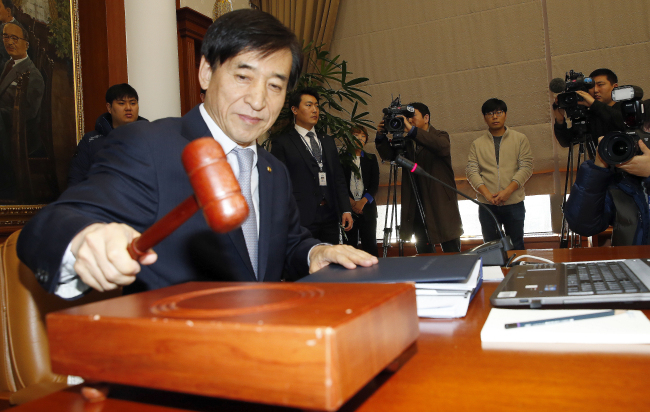Korea’s central bank is widely expected to freeze interest rates at the current record-low level at its rate-setting meeting Tuesday, while keeping a cut on the table for the next review.
“There is certainly bigger pressure (now than before) on the Bank of Korea to slash interest rates and align its policy with a global easing trend,” said Yoo Sun-woong, fixed-income analyst at LIG Securities in Seoul.
“But the BOK is likely to deem the time is not ripe yet for a rate change and instead choose to give markets a signal of a cut to come,” he said, predicting the BOK would stay put on rates for the eighth month in February. A reduction is more likely later in the first half of the year, he added.
 |
Bank of Korea Gov. Lee Ju-yeol (Yonhap) |
The view echoes the consensus in the markets.
A survey of 100 bond market participants, conducted by the Korea Financial investment Association, shows 99 percent of the respondents expect the central bank to stay put at the forthcoming monthly rate review session, while betting on a future rate cut.
Korea’s key rate stands at 1.5 percent, the lowest on record and unchanged since June 2015. The BOK had slashed it by a cumulative 1 percentage point via four rate cuts from August 2014.
“It appears that the bond market has already priced in a rate cut,” said Lee Mi-sun, analyst at Hana Financial Investment.
The yield on the benchmark three-year Korean government bonds stood at 1.475 percent Friday, below the BOK-set base rate, Korea Exchange prices showed.
“In the past when such conditions occurred, the key rate was slashed one to four months afterward,” she said.
The case for a future, albeit not immediate, rate reduction has strengthened in recent weeks on domestic and global factors, experts said.
At home, the economic mood has darkened with a sharp monthly decline in exports in January, still-weak domestic demand and Cold War-era geopolitical tensions with North Korea denting investor sentiment.
Overseas, central banks in major economies, namely Japan and Europe, have gone as far as to adopt negative interest rates to rejuvenate growth, while the U.S., which in December entered a tightening cycle ending a seven-year era of flush liquidity, signaled last month a slower pace of rate hikes.
What makes the BOK hesitant toward slashing the rate to a fresh low, the pundits said, is that it is not sure yet whether the previous rate cuts have had their anticipated impacts on the real economy.
With household debt at a record 1,200 trillion won and the ongoing outflow of foreign capital, “another rate cut could have bigger negative side effects (on the economy than its desired impact of helping the recovery),” warned Lee Jun-hyup of Hyundai Research Institute.
BOK Gov. Lee Ju-yeol, meeting reporters in December, confessed to similar concerns, saying that low interest rates do not seem to boost private consumption as much as expected.
“Financial imbalances have grown due to a prolonged monetary easing cycle,” he said, stressing that monetary policy alone can’t bring about a turnaround in a cooling economy.
By Lee Sun-young
(
milaya@heraldcorp.com)




![[Herald Interview] 'Trump will use tariffs as first line of defense for American manufacturing'](http://res.heraldm.com/phpwas/restmb_idxmake.php?idx=644&simg=/content/image/2024/11/26/20241126050017_0.jpg)

![[Health and care] Getting cancer young: Why cancer isn’t just an older person’s battle](http://res.heraldm.com/phpwas/restmb_idxmake.php?idx=644&simg=/content/image/2024/11/26/20241126050043_0.jpg)

